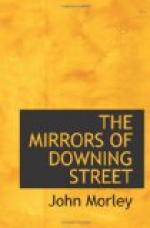The truth is that Mr. Asquith possesses all the appearance of greatness but few of its elements. He has dignity of presence, an almost unrivalled mastery of language, a trenchant dialectic, a just and honourable mind; but he is entirely without creative power and has outgrown that energy of moral earnestness which characterized the early years of his political life.
He has never had an idea of his own. The “diffused sagacity” of his mind is derived from the wisdom of other men. He is a cistern and not a fountain.
His scholarship has made no difference to scholarship. His moral earnestness has made no difference to morality. He acquired scholarship by rote, politics by association, and morality by tradition. To none of these things did he bring the fire of original passion. The force in his youth was ambition, and the goal of his energy was success. No man ever laboured harder to judge between the thoughts of conflicting schools; few men so earnest for success ever laboured less to think for themselves. He would have made a noble judge; he might have been a powerful statesman; he could never have been a great man as Mazzini, Bismarck, and Gladstone were great men.
There are reasons for suspecting his moral qualities. When he allowed Lord Haldane to resign from the Cabinet at the shout of a few ignorant journalists he sacrificed the oldest of his friends to political exigencies. This was bad enough; but what made it worse was the appearance of heroic courage he assumed in paddling to Lord Haldane’s rescue long after the tide of abuse had fallen. During the time he should have spoken to the whole nation, during the time he should have been standing sword in hand at the side of his friend, he was in negotiation with Sir Edward Carson.
It is a mistake to say that he brought England into the war. England carried Mr. Asquith into the war. The way in which politicians speak of Mr. Asquith as having “preserved the unity of the nation” in August, 1914, is index enough of the degraded condition of politics. A House of Commons that had hesitated an hour after the invasion of Belgium would have been swept out of existence by the wrath and indignation of the people. Mr. Asquith was the voice of England in that great moment of her destiny, a great and sonorous voice, but by no means her heart. He kept faction together at a moment when it was least possible for it to break apart; but he did not lead the nation into war. It was largely because he seemed to lack assurance that Lord Haldane was sacrificed. The Tories felt that Mr. Asquith would not make war whole-heartedly: they looked about for a scapegoat; Lord Haldane was chosen for this purpose by the stupidest of the Tory leaders; and the bewildered Prime Minister, with no mind of his own, and turning first to this counsellor and then to that, sacrificed the most intellectual of modern War Ministers, called Sir Edward Carson, to his side, and left the British war machine to Lord Kitchener.




